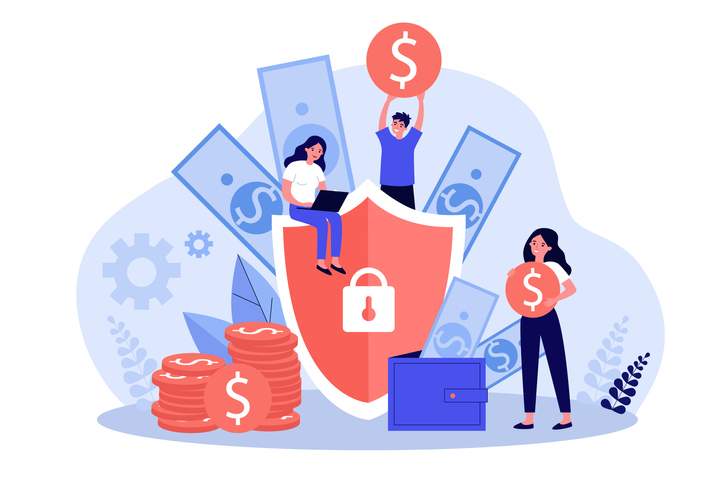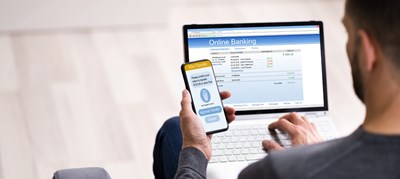Information security and fraud prevention

Featured lessons

Common holiday scams unwrapped
Just like you, fraudsters love the holidays. They know you’re busy, distracted and full of holiday cheer. All which makes it even easier to fall for their gift-wrapped scams that are even more convincing, personalized and automated thanks to AI.
To help you stay safe during the holidays, and year round, we’ve unwrapped the most common holiday scams along with some practical safety tips.
One thing to keep in mind is that financial institutions typically follow information security guidelines and never reach out to ask for personal or sensitive information. If you get a request for your banking username, password, account number, routing number or your complete Social Security number, be very suspicious. Contact your financial institution via a number you’ve verified from a trusted source like a monthly statement, your financial institution’s app or its official web site.

How to Spot Financial Grooming Scams
Scammers no longer rely on quick-hit phishing scams; instead, they patiently cultivate online relationships — a tactic investigators call financial grooming. This article unpacks how grooming scams unfold and the red flags to watch for. We also detail the practical actions you and your loved ones can take to shut fraudsters out.

How to Protect Yourself from Spear Phishing Attacks
Cyber threats have become increasingly sophisticated, targeting not just large corporations but individuals as well. Among these threats, the spear phishing attack is one of the most deceptive and damaging. So, what is a spear phishing attack, and how do you protect yourself?

Stay Safe in the End Zone: Avoiding Financial Scams During Football Season
Football season is a time for excitement, cheering on your favorite team, and creating lasting memories with friends and family. However, it's also a time when scammers are on the lookout to take advantage of distracted fans. From fake tickets to fraudulent online offers, football season provides scammers with numerous opportunities to trick unsuspecting victims. By staying alert and knowing how to spot common scams, you can protect your finances while enjoying the game.

Protecting Your Finances: Cybersecurity Best Practices
In today's digital world, protecting your finances has become more challenging than ever. With cybercriminals constantly devising new ways to access personal information and compromise accounts, it’s crucial to stay informed and practice good cybersecurity habits. Whether you're managing your finances online or simply browsing the web, knowing how to safeguard your data can prevent financial loss and protect your personal information from falling into the wrong hands.

Avoiding Holiday Scams: From Phishing to Travel Frauds
The festive season is a time of joy, giving and celebration. But as you prepare to dive into the celebrations, you must be on guard against scams that could ruin your festivities. From convincing phishing emails decorated with jingle bells to too-good-to-be-true travel deals promising a winter wonderland, the tactics are endless and, sadly, effective.
Generally, financial institutions follow information security guidelines and never request personal or sensitive information. Therefore, any call or information request for your banking information, such as banking username and password, account number, routing number or social security number, should be treated with the utmost suspicion.
As technology evolves, scammers are getting more sophisticated. Some of their rackets appear genuine. Thus, you must be extra vigilant, especially during this holiday season. Here's a detailed overview to equip you against potential pitfalls.

Ensuring Member Data Security: How Credit Unions Safeguard Your Information
In an era marked by rapid technological advancements and the growing significance of data in various sectors, the safety and security of personal information have become paramount. Credit unions, financial institutions that serve their members' financial needs while operating as non-profit organizations, are no exception to this rule.
With the increasing reliance on digital platforms for banking and transactions, credit unions have taken robust measures to keep member data safe and secure. In this article, we explore the strategies employed by credit unions to protect their members' sensitive information.

What is Two-Factor Authentication (2FA)?
Two-factor authentication is a security process that requires two different authentication methods before granting access to an online account or system. Discover the benefits of two-factor-authentication and how to enable it to protect your information.

Guarding Your Finances: A Guide to Shielding Against Social Engineering and Phishing Attacks
In today's interconnected world, safeguarding your financial well-being requires more than just responsible money management; it involves protecting yourself from evolving online threats like social engineering and phishing attacks. This article aims to empower you with knowledge and practical tips to keep your accounts and personal information secure.

Protecting Your Finances: Navigating Social Media Safely in the Digital Age
In today's interconnected world, social media platforms have become an integral part of our lives. They help us stay connected with friends and family, share experiences, and even manage our finances. However, the same platforms that bring us together can also pose risks to our cybersecurity and personal information. In this article, we'll explore the intersection of social media and cybersecurity, and provide tips on how to protect yourself and your finances in the digital age.

Strengthening Your Financial Security: The Importance of Strong Passwords
In today's digital age, safeguarding your financial information is more critical than ever. One of the simplest yet most effective ways to protect your accounts is by ensuring you have strong, secure passwords in place.

Five Holiday Scams to Avoid
The holiday season is one of the busiest times of year, especially as people shop, gather, exchange gifts and travel. Scammers and criminals see it as an opportunity to steal your personal information or try to trick you into sending money. Read this article to learn more about common holiday scams and how to avoid them.

Don't Be Fooled: Know What Information Ent Will Never Ask You For
Here at Ent Credit Union, we go to great lengths to protect our members. A new scam has started affecting some of our members, and we want to help you stay safe. Learn how to protect your financial and personal information online, so you don't have to worry about a stranger taking your money and always be aware of scams. Instead of robbing banks with black hoods over their faces, today’s thieves spend their time scamming everyday consumers and businesses out of their hard-earned money. Suspicious calls, texts, and emails can catch some people off guard, giving fraudsters a chance to drain their bank account.

What is Unemployment Fraud? Unemployment Insurance Fraud on the Rise
Since the pandemic, unemployment insurance fraud has been increasing. If you have been the victim of fraud, read this article for steps to take.

Multifactor Authentication (MFA): Enhanced Security with MFA Technology
We're routinely enhancing our online security measures to help keep your account safe.

How to Protect your Identity
Be proactive in safeguarding your sensitive, personal and confidential information. Protecting this information makes it difficult for someone to assume your identity to commit fraud or other criminal acts. Focus on best practices in these areas to help keep your information safe:

Protect Devices: How-to Protect Your Device from Hackers
Many of us store personal, sensitive and confidential information on our digital devices. This makes them an attractive target for scammers and criminals. Follow best practices in these areas to help keep your devices secure:
Latest resources

Common holiday scams unwrapped

How to Spot Financial Grooming Scams

How to Protect Yourself from Spear Phishing Attacks

Stay Safe in the End Zone: Avoiding Financial Scams During Football Season

Protecting Your Finances: Cybersecurity Best Practices

Bank Scams: What it is, how to prevent it & the different types
Browse more
View All
How Do I Know If I've Been Scammed? Common Red Flags

What is Two-Factor Authentication (2FA)?

Navigating the New Normal: Software Updates and Working from Home

Avoiding Holiday Scams: From Phishing to Travel Frauds

Help I've Been Scammed! What Should I Do Now?

Mobile Banking Safety Tips

How to Protect Your Elderly Parents from Financial Scams

How Can I Protect My Elderly Parent’s Money?

Multifactor Authentication (MFA): Enhanced Security with MFA Technology

How to Protect Your Identity and Money During Tax Season

Strengthening Your Financial Security: The Importance of Strong Passwords

Guarding Your Finances: A Guide to Shielding Against Social Engineering and Phishing Attacks
More about Ent